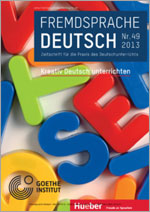Issue 2/2007 - ISSN 1470-9570
ARTICLES
„Körperliche Stärke und Behendigkeit zu ehren” oder Olympia in Berlin: Der deutsche Idealismus, die Sportwettkämpfe im antiken Griechenland und das moderne Deutschland.
Felix Saure, Marburg (pages 7-27)
Einer der prominentesten Vertreter der deutschen Griechenbegeisterung um 1800 ist Wilhelm von Humboldt. Sein Bild vom antiken Hellas ist nicht das Ergebnis eines empirisch-analytischen Umgangs mit der Geschichte und der Kunst des alten Griechenland, sondern ein idealistisches Konzept mit weitreichenden kulturkritischen, ästhetischen und auch politischen Ansprüchen. In diesem Aufsatz wird ein exemplarischer Aspekt seiner Antikerezeption analysiert, die Rolle der Körperkultur und der panhellenischen Spiele (Agones) in Griechenland. Im Vergleich mit einigen Ansätzen Schillers, Herders und Winckelmanns zeigt sich, dass Humboldts Denken über das klassische Altertum zeittypisch ist. Aus seiner idealistischen Perspektive manifestiert sich in der hohen Achtung, die die Griechen einer ganzheitlichen und damit auch körperlichen Bildung des Einzelnen erwiesen, ihre unbedingte Vorbildhaftigkeit. Außerdem werden die gesamtgriechischen Wettkämpfe als Ausdruck einer Nation gesehen, die sich als kulturelle Einheit und nicht als politisches System definiert. Dieser Aspekt des Griechenideals diente im 19. Jahrhundert der nationalkulturellen Identitätsformierung der Deutschen, die sich als Kulturnation dem alten Hellas verwandt fühlten. Für die Deutschen sollten deshalb moderne Agones eine staatenübergreifende gemeinschaftsstiftende Rolle spielen. Insgesamt bilden in der idealistischen Wahrnehmung um 1800 Körperkultur und Wettkämpfe der Griechen in konzentrierter Form das überzeitliche Ideal einer harmonischen Menschenexistenz ab; Sport und Körper werden in diesem Denken ästhetisch und politisch aufgeladen..
‘Im Sport ist der Nerv der Zeit selber zu spüren’: Sport and Cultural Debate in the Weimar Republic.
Jon Hughes, London (pages 28-45)
This article presents, in its social and historical context, an account of the relationship between cultural-political discourse and the conceptualization and practice of sports in the Weimar era, a period in which sport underwent extraordinary expansion and development. It attempts to elucidate the manner in which the cultural debates prompted by sport, and the popularity of sport, can be said to reflect cultural faultlines. Drawing on a broad range of journalistic and literary responses to sport, the article considers rival conceptions and definitions of sport, perceptions of the connections between sport and national identity, criticism of the emphasis upon performance and records, and of the commercialization of professional sport at the expense of amateur Volkssport, and the ambivalent relationship between art and sport. It includes a detailed case-study examination of responses to a particular sporting phenomenon of the era, the hugely popular Sechstagerennen (six-day bicycle races) in Berlin. Authors considered include significant names such as Bertolt Brecht, Erich Maria Remarque, Egon Erwin Kisch, Joseph Roth, and Alfred Polgar, as well as significant contemporary sports theorists such as Willy Meisl and Carl Diem.
Behind the Wall: East German football between state and society.
Mike Dennis, Wolverhampton (pages 46-73)
Newly declassified archival sources, fans’ recollections and recent research monographs have been drawn upon to trace the frequent restructuring of GDR football, the ruling SED’s vain attempts to exploit the popularity of the game to boost the reputation of the socialist system, and football’s success in retaining its position as a beneficiary of the state-run programme for elite sport. Despite the additional generous aid from patrons in industry and the regions, the national team and top clubs made little impact in the World Cup and European tournaments. This was true of the leading club in the 1980s, BFC Dynamo, which derived, much to the annoyance of envious rivals, special privileges as a result of the influence of the powerful Minister of State Security, Erich Mielke. This conflict between clubs, as well as between patrons eager for enhancement in status through links with the country’s most popular sport, was typical of conditions in GDR football and reveals a degree of segmentation of political and social influence not normally associated with the finely-tuned system of elite sport.
Das Hueber-Portal für DaF/DaZ-Kursleiter und –Lehrer bietet zahlreiche nützliche Online-Services für Ihren Unterricht: www.hueber.de/deutsch-als-fremdsprache
Besuchen Sie auch den Infoservice zu:
Fremdsprache Deutsch - Zeitschrift für die Praxis des Deutschunterrichts
Herausgegeben vom Hueber Verlag in Zusammenarbeit mit dem Goethe-Institut
www.hueber.de/fremdsprache-deutsch






